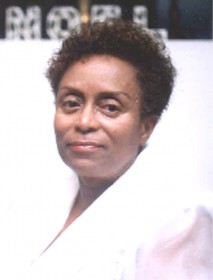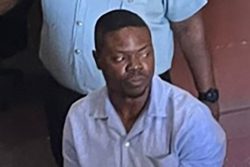AFC concerned at administration’s activities in some communities
With political party campaign finance laws largely ignored, Guyana like other Caribbean states is vulnerable to the corruption of the electoral process, according to AFC Vice-Chairperson Sheila Holder who told Stabroek News the party is concerned about the activities of the administration, particularly in indigenous and depressed communities.
She argued that large sums are being spent for politicking under the guise of giving

assistance.
Based on a Peer Review Session, held at the Miami International University (MIU), Florida on “Political Party and Campaign Financing in the Caribbean,” held in May this year, the Organisation of American States (OAS) has announced that it had started work on comprehensive political party and campaign finance reform in the region. Holder was a participant at the session.
She has reported that it was agreed that regulatory reforms initiated in Jamaica and Trinidad & Tobago would see civil society in the two islands targeted for public sensitisation exercises to be supported by the OAS. Given the economic realities of the region, partial funding of political parties and their campaigns is to be recommended, she explained in her May 22, 2009 report to the AFC National Executive. She further revealed that former St. Lucia Prime Minister Kenny Anthony was to be considered for recruitment to prepare a model law for the region, based on clearly defined campaign financing and political party funding recommendations which came out of the Peer Review session. Holder was to propose the name of a PPP/C MP to work along with the group.
The Peer Review team comprised: UWI Professors Trevor Munroe and Ramesh Deosaran; UWI Political Science lecturer Cynthia Barrow-Giles; Chairman of the St. Lucia Elections Commission, Kenneth Monplaisir; Director of the Caribbean Development Research Services (CADRES) Peter Wickham; Senior OAS Specialist Steven Griner; Special OAS Advisor on Caribbean Affairs Paul Spencer; Director of the Department of State, Modernization & Governance in the OAS Pablo Zuniga and Holder.
In a press statement issued in May, the OAS noted that through the financial support from the Government of Spain, it hosted the roundtable discussion to identify the salient issues of this crucial topic, which will be encapsulated in a working paper. It announced that it had started work on comprehensive political party and campaign finance reform in the region towards instituting a key recommendation of its electoral observation missions. It said the main purpose of the project initiative is to contribute to increased transparency, to strengthen the integrity of political party and electoral finance in the Caribbean and to establish sustainable mechanisms for the regulation of political party and campaign financing in that region.
The OAS had said it intended to make the working paper public in July and that the paper would call for specific requirements for political party registration, increased disclosure and strengthened enforcement. The paper and the model legislation will be presented and discussed in a series of meetings throughout the Caribbean scheduled during this year, the OAS added.
According to Holder’s report, as convenors of the Peer review sessions, the OAS representatives indicated that the selection of the participants was based wholly on their choice of individuals whom they thought had sufficient influence in their respective societies to guide the OAS in their objective to address growing international concerns about the generally unregulated financing environment of political parties and elections campaigns in the region. The sessions were held in camera to allow for sensitive disclosures to be treated confidentially.
According to Holder’s report, the participants reviewed the draft paper entitled “Political Party Campaign Financing in the Caribbean” prepared by Professor Munroe, who found that most Caribbean countries have generally not been enforcing political party campaign financing regulations most of them have in place. She noted that several instances of campaign financing scandals in the region were highlighted in the draft paper, including President Bharrat Jagdeo’s allegation that the AFC 2006 elections campaign was funded in part by a donor with links to a narcotics case. Holder reported that she defended the party from the President’s accusation and further pointed out that campaign financing legislation featured prominently in the AFC’s parliamentary agenda.
In August 2004, during his last visit to Guyana, former US President Jimmy Carter had held discussions with stakeholders on political campaign finance reform and he had said it was agreed that regulations would be put in place to have the origin of campaign funds revealed.
However, reforms are yet to get underway and laws remain observed in the breach. According to Holder, there is still an environment open to manipulation, where large sums of money can be used to divert the race from issues to which party could out-buy the electorate.
Holder expressed concern about the administration’s actions in indigenous communities as well as depressed areas, where according to her state funds are being utilised for political objectives under the guise of giving assistance. She accused the governing party of supporting party hacks in such areas. “You interject this political element into it and it undermines confidence in government,” she said, adding, “It’s all about money and attached to that is the corrupt or illegitimate means of acquiring funds for the political process.”
In the absence of any regulatory framework for political parties, Holder noted that unlike the other parties the AFC has opted to be formally registered under the Guyana Companies Act as a non-profit entity. She added that the party’s New York/New Jersey Chapter was also registered in the US as a not-for-profit entity. She emphasised the party’s interest in ensuring transparency and accountability in this vein. “So what we are engaged in is a very forward thinking political approach which signals our desire to indeed be the change agents in this regard,” she added.
Polls
Meanwhile, Holder also said that concerns were raised during the in camera discussion about the work of pollster Vishnu Bisram, whom some felt produced fictitious polls.
She said she felt constrained from responding to recent media reports here about the discussions since they were in camera. However, she explained the issue is addressed tangentially in her report of the conference, where some of the participants – and not the OAS – expressed independent views about polling. According to her report, the concerns were based on investigations in the Caribbean that contended that Bisram conducted no credible polls but had a good sense of human nature and how to manipulate multiracial societies in Guyana and Trinidad and Tobago. He has failed to be accurate in any other Caribbean country or elsewhere in the world, her report contended.
Holder explained that it was felt that certain standards must be established and she noted that there was concern about the subversion of the political process in the face of polls which didn’t have validity. In this regard, while it was noted that there should be no attempt to control publication of polls in the region, the session recognised that the press should be advised that polls should meet some criteria before publication, Holder said. There was also the view that there is need for an association of pollsters.
However, Holder emphasised that the main focus of the confab was the scandals in election campaign financing that was overshadowing the region and the need for reforms. “To trivialise it is to miss the point,” she explained, “There is a bigger issue and the issue of polling just came up, it was not part of the agenda but opinions were expressed by persons attending the sessions.”







